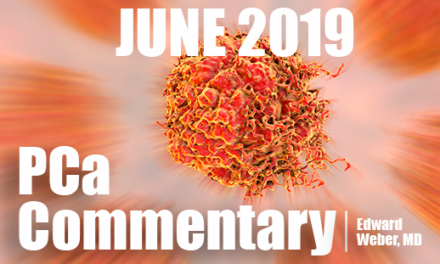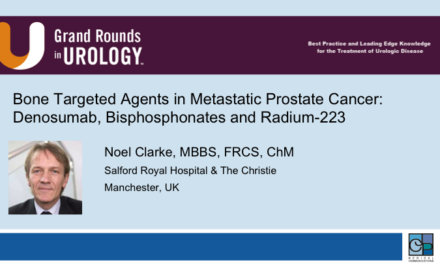
PCa Commentary | Volume 157 – September 2021
Posted by Edward Weber | September 2021
Metastatic Hormone Sensitive Prostate Cancer (mHSPC): Increasing in Incidence; Treatment Options Evolving
Metastatic hormone-sensitive prostate cancer refers to cancers which are found to have metastasized at diagnosis prior to primary treatment and therefore have not been exposed to testosterone deprivation. The incidence of this stage of cancer at diagnosis increased after the misguided recommendation of the USPSTF to limit PSA testing in 2017.
The occurrence will further increase as the sensitive PSMA PET/CT scans evaluate men with intermediate-risk and high-risk cancers with 68Ga-PSMA-11 PET/CT and the recently FDA-approved Pylarify PET/CT. There is general consensus that PET/CT scanning with these agents is significantly more sensitive than the venerable, relatively insensitive, standard CT and technetium bone scans. A wealth of evidence documents that the findings on these advanced PET/CT scans substantially change the management of men with these categories of disease, often revealing that the disease has already spread to pelvic nodes and beyond the pelvis.
The long-running European randomized PEACE-I clinical trial began in 2013, with a now cumulative to-date total of 1173 men who have been studied. It aims at defining the optimal treatment for men with mHSPC. The trial has evolved with a series of iterations in the comparator ‘standard of care’ arm which, for ethical reasons, incorporated the treatment schemas found most effective at an earlier stage of the randomized study. Prior to the findings of this study, androgen suppression alone, i.e., with leuprorelin or degarelix, was the accepted treatment for metastatic cancer at presentation.
Combination Therapy with Androgen Deprivation and Docetaxel Chemotherapy.
The pivotal study CHAARTED, or “Chemohormonal Therapy in Metastatic Hormone-sensitive Prostate Cancer” (Sweeny et al., NEJM Aug 2015), randomized 790 men with mHSPC to ADT alone vs ADT + docetaxel. The six cycles of chemotherapy were initiated at the onset of ADT. The study group was composed of men with aggressive disease: 65% having a high tumor burden and 60% with a Gleason score of 8 or greater. The median PSA level at the start of ADT was ~50 ng/mL.
“After a median follow-up of 28.9 months, the median overall survival was 13.6 months longer with ADT plus docetaxel than ADT alone, 57.6 months vs. 44.0 months ….” PSA progression was also prolonged in the combination arm: 20.2 mo. vs. 11.7 mo. Significant infectious complications occurred in 6.2% in the combination arm; clinically significant sensory neuropathy occurred in 0.5%. This trial initiated the current era of combination therapy for mHSPC.
Although this study found that chemohormonal therapy conferred a greater benefit to men with high-burden disease, reanalysis of the STAMPEDE trial data found that “the clinically significant benefit in survival for upfront docetaxel persists at longer follow-up, with no evidence that benefit differed by metastatic burden” (N.W. Clarke et al., Original Articles Urogenital Tumors, Dec 2019).
The Next Step: Adding Abiraterone.
As a result of several large, randomized trials, “the addition of either docetaxel (chemohormonal approach) or an AR pathway inhibitor (abiraterone, enzalutamide or apalutamide) is a reasonable standard of care option for men commencing long-term ADT for mHSPC” (Kwan et al., World Journal of Urology, 2021). Kwan also cited that “recent data [STAMPEDE] support consideration of upfront docetaxel in all patients, regardless of metastatic burden.”
The PEACE-I series built on its earlier work and then used the ADT/chemotherapy arm as the ‘standard of care’ and compared it to a triplet of ADT/docetaxel/abiraterone. The data was presented at ASCO June 2021 by Dr. Karim Fizazi. At a median follow-up of 36 months, radiologic progression-free survival (rPFS) was 4.5 years for the triplet arm vs. 2.2 for the doublet. The overall survival data was not sufficiently mature at that time. An important study finding was that the addition of abiraterone prolonged the development of castration resistance to a median of 3.8 years as opposed to 1.5 in the ADT/docetaxel arm.
Although the final evaluation of the comparison between the doublet and triplet regimens awaits the data on overall survival, in discussing this trial at ASCO 2021 Dr. Fizazi, the trial’s principal investigator, pondered whether the triplet therapy should be considered the new standard of care of mHSPC.
Selection of mHSPC Patients for Doublet or Triplet Therapy.
The remarkable benefit resulting from combined therapy as opposed to ADT alone supports the use of one of the tested regimens. The upfront docetaxel takes advantage of candidates’ better physical condition to withstand the adverse effects of chemotherapy. Additionally, on a molecular level docetaxel has been found to improve the potential of ADT by impairing the function of the androgen receptor (Zhu et al., Cancer Research, 2010).
However, a patient’s general fitness for cytotoxic chemotherapy needs consideration because of the hematologic and neurologic toxicity of docetaxel. Abiraterone is associated with an increase in hypertension and cardiac arrhythmias, and a 12-15% increase in any grade of hepatotoxicity. These adverse effects may limit the use of this agent in men with these conditions.
BOTTOM LINE:
As concluded by Kwan, “The introduction of potent systemic therapy earlier in mCNPC [metastatic castration-naive prostate cancer] has resulted in dramatic improvement in clinical outcomes for patients,” … notably the nearly 2 1/2 year prolongation of radiographic progression-free survival with the triplet regimen of ADT/docetaxel/abiraterone/prednisone (5mg twice daily). Overall survival data is awaited. Additional research will likely yield further improvement.
Your comments and requests for information on a specific topic are welcome e-mail ecweber@nwlink.com.
Please also visit https://prostatecancerfree.org/prostate-cancer-news for a selection of past issues of the PCa Commentary covering a variety of topics.
“I want to thank Dawn Scott, Staffperson, Tumor Institute Radiation Oncology Group, and Mike Scully, Librarian, Swedish Medical Center, for their unfailing, timely, and resourceful support of the Commentary project. Without their help this Commentary would not be possible.”
ABOUT THE AUTHOR
Edward Weber, MD, is a retired medical oncologist living in Seattle, Washington. He was born and raised in a suburb of Reading, Pennsylvania. After graduating from Princeton University in 1956 with a BA in History, Dr. Weber attended medical school at the University of Pennsylvania. His internship training took place at the University of Vermont in Burlington.
A tour of service as a Naval Flight Surgeon positioned him on Whidbey Island, Washington, and this introduction to the Pacific Northwest ultimately proved irresistible. Following naval service, he received postgraduate training in internal medicine in Philadelphia at the Pennsylvania Hospital and then pursued a fellowship in hematology and oncology at the University of Washington.
His career in medical oncology was at the Tumor Institute of the Swedish Hospital in Seattle where his practice focused largely on the treatment of patients experiencing lung, breast, colon, and genitourinary cancer and malignant lymphoma.
Toward the end of his career, he developed a particular concentration on the treatment of prostate cancer. Since retirement in 2002, he has authored the PCa Commentary, published by the Prostate Cancer Treatment Research Foundation, an analysis of new developments in the prostate cancer field with essays discussing and evaluating treatment management options in this disease. He is a regular speaker at various prostate cancer support groups around Seattle.




